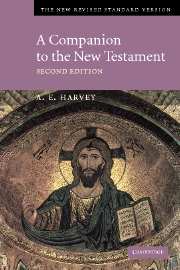Book contents
- Frontmatter
- Contents
- Preface
- Preface to the First Edition (1970)
- THE NEW TESTAMENT
- THE GOSPELS
- THE ACTS OF THE APOSTLES
- LETTERS
- Romans
- 1 Corinthians
- 2 Corinthians
- Galatians
- Ephesians
- Philippians
- Colossians
- 1 Thessalonians
- 2 Thessalonians
- 1 Timothy
- 2 Timothy
- Titus
- Philemon
- Hebrews
- James
- 1 Peter
- 2 Peter
- 1 John
- 2 John
- 3 John
- Jude
- THE REVELATION
- Old Testament References
- Index
- Frontmatter
- Contents
- Preface
- Preface to the First Edition (1970)
- THE NEW TESTAMENT
- THE GOSPELS
- THE ACTS OF THE APOSTLES
- LETTERS
- Romans
- 1 Corinthians
- 2 Corinthians
- Galatians
- Ephesians
- Philippians
- Colossians
- 1 Thessalonians
- 2 Thessalonians
- 1 Timothy
- 2 Timothy
- Titus
- Philemon
- Hebrews
- James
- 1 Peter
- 2 Peter
- 1 John
- 2 John
- 3 John
- Jude
- THE REVELATION
- Old Testament References
- Index
Summary
Author and recipients
James was a common name (it was the Greek equivalent of the Hebrew name Jacob), and there are at least five men who bear it in the New Testament alone. But this James writes with authority and has apparently no need to explain who he is: his mere name is enough to command attention. Only one of the men called James in the New Testament held such a prominent position in the church. This was James, the brother of Jesus, who became the leader of the church in Jerusalem.
Is this letter from his hand? No other James has ever been suggested, and it was as a document bearing the authority of the Lord's brother that the letter was given a place among the writings of the New Testament – though it was several centuries before it became firmly accepted. But in modern times serious doubts have been felt. Could a man of James' relatively humble Galilean background have written such sophisticated Greek? Is it likely that Jesus' own brother would have been content to write to the churches without mentioning any of the central beliefs of the Christian faith such as the crucifixion or the resurrection? Is the somewhat Hellenized Jewish culture displayed by the author what one would expect from one who had the reputation of maintaining an orthodox Jewish way of life in Jerusalem even after he was converted to Christianity?
- Type
- Chapter
- Information
- A Companion to the New Testament , pp. 720 - 733Publisher: Cambridge University PressPrint publication year: 2004



